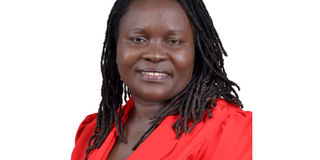Defending human dignity should be everyone’s duty

What you need to know:
Universal responsibility. Defending human dignity should be every person’s call. If we do, the future of our children will be bright. The prospects for the future even brighter. As Pope John Paul II once said, ‘a society that is not just and does not intend to be puts its own future in danger.’
The hyped Anti-Corruption Walk led by President Museveni has reminded me of how in May I participated in a public walk for the first time. I was very reluctant because memories of Black Monday and Walk-to-Work surfaced. After attending several preparatory meetings at the Uganda Human Rights Commission (UHRC) offices, I decided that it was safe. Surely, this would not be met with teargas, I reasoned. Besides, if I was sending 20 of my students to walk, the only way not to worry about their safety was if I walked with them.
So May 3, we walked from the railway grounds, flagged off by [Minister in Charge of General Duties in the Office of the Prime Minister] Mary Karooro Okurut, arguably, a friend of the media. The Prison Band gave us excellent music and together with fallen UHRC chairperson Medi Kaggwa and friends from the UN Human Rights and diplomatic corps, we enjoyed the walk and returned to the railway grounds safe. It was surreal. I never thought it was possible to walk for any cause without teargas. So our celebration of press freedom day was thankfully, uneventful.
This year’s Human Rights Day will perhaps be the toughest for my friends at the UHRC, who are still dealing with their loss. As we celebrate the day tomorrow, I celebrate all those who defend human rights in this country, despite the Public Order Management Act (POMA) always watching and waiting for ‘wrong’ elements.
That day, I realised that human rights, like many things conveniently tagged ‘Western ideals’, remains largely donor-supported. I wonder to what extent development assistance is improving the human rights situation in Uganda, given the many efforts. For example, in 2000, the United Nations advanced the capability approach of Martha Nussbaum and Amartya Sen in the Human Development Report, ‘Human Rights and Human Development’. It was argued, the two shared the same motivation, which is to advance the dignity, wellbeing and freedom of individuals in general.
The policy and legal framework for the protection of human rights is mostly favourable in Uganda. The entire Chapter Four of our Constitution provides for human rights promotion and protection. Most of the international protocols for human rights have been signed, ratified and domesticated. Women, youth and children’s rights are further reinforced.
As such, some progress has been made. Many Ugandans are aware of their rights and report abuses. The UHRC has been committed to documenting cases, providing advice and investigating issues reported.
More progress in the area of social and economic rights have been made through free primary and secondary education, extension of health care and provision of water services, although much needs to be done to bridge the gaps in rural areas.
The problem is that the state of human rights is not an interesting subject for discussion. Annual reports of the UHRC are very telling on this. Numerous cases of violations stare at us. Even those of journalists alone provide interesting cases. Violation of rights of children, women, the youth and elderly occur. Many children do not go to school despite free education, majority of the youth are unemployed and some Ugandans are at the brink of poverty. Additionally, while progress on the social and economic rights were made, those on civil and political rights are seemly regressing.
The reality is that the practical reach of the Constitution as a foundation for human rights protection and the reluctance of duty bearers to promote and defend human rights needs to be called out. Stringent enforcement of laws, effective implementation of policies, strengthening institutions of the justice, law and order sector, and those charged with service delivery, are key building blocs for the respect of human rights.
More so, we need to be deliberate about linking human rights to human development. Many government ministries, departments and agencies operate as if their role has little to do with human rights and human development, because they think in the specific silos within which they operate. Yet in reality, linking development policy with human rights would reap the greatest results. The human development report of 2000 acknowledged this, noting that “the basic idea of human development, that enriching people’s lives and freedoms of ordinary people is fundamental, has much in common with the concerns expressed by the declarations of human rights.”
Defending human dignity should be every person’s call. If we do, the future of our children will be bright. The prospects for the future even brighter. As Pope John Paul II once said, ‘a society that is not just and does not intend to be puts its own future in danger’. It is easy for those of us who are fortunate not to be in the line of degrading human treatment because of our beliefs, political expression and opinions to think that those who suffer have made the wrong choice. But my friend, a respectable lawyer always reminds me that it is easy to be on the ‘wrong side’, for no fault at all. It keeps me in check. Human rights matter for all.
Dr Maractho is the head and senior lecturer, Department of Journalism and Media
studies at UCU. [email protected]


